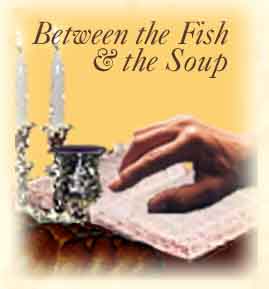
by Jacob Solomon
This Week's Parsha | Previous issues | Welcome
- Please Read!
e-mail: jacobsol@netvision.net.il
| 'If a matter of judgment is too difficult for you to resolve…You shall approach the Priests, the Levites, and the judge of the time… You shall inquire and they will tell you the words of the judgment…You shall be careful to do according to everything that they will teach you.' (17:8-10)
The above states that the contemporary leading religious authorities are the final arbiters in Halachic disputes. The expression the judge of that time is understood by the Talmud to include judges of lesser caliber than those of previous generations. 'Jephtah in his generation is as Samuel in his generation' (Rosh Hashanah 25b). Thus a person must not cut himself off from the direction of today's Torah scholars, claiming that they are not as great as those of the previous generation. Why were those two judges in particular specified as the extremes of superior and inferior arbiters? True, the Psalms, (99, as explained by Rosh Hashanah, ibid.) testify to the superlative greatness of Samuel; namely by regarding him as the equal of Moses and Aaron. However Samson, rather than Jephtah would appear to have been the least worthy of the Judges. This is implied in both the Biblical account of his career (Judges 14-16), and in the way in which his memory was referred to by Samuel: G-d sent Jerubaal and Bedan, and Jephtah and Samuel (Samuel I 12:11). Here, Samuel seems to have referred to Samson casually as 'Bedan' - 'in the tribe of Dan', whereas Jephtah, in contrast, was as at least given the respect of being called by name. One possible approach is to consider that within their careers they both had to make Halachic decisions over nedarim - vows. These vows were similar, in that they both involved matters of life and death. The way each Judge handled his own situation brought out their respective contrasting qualities. Jephthah made a vow to sacrifice as a burnt offering to G-d whatever first came out of his house, in the event of his campaign against Ammon being successful (Judges 11:30-1). Sadly for him, 'whatever first came out of his house' turned out to be his own daughter. The text states that she met a tragic end, whose precise details are a debate between the major commentaries. The important point is that Jephtah was not lenient - he did not find a way 'around' the vow. And his daughter suffered the most unpleasant consequences of her father's stringency. Samuel, as a Judge, had to deal with a similar vow made by Saul, his protege, concerning the war against the Philistines. Saul vowed the death penalty on whoever tasted food on the day of the battle. His son Jonathan, not knowing about his father's neder, found some honey and ate it (Samuel I 14:24,44). Unlike Jephtah, Saul, who had Samuel as his religious guide, found a way out. When the people protested that the whole victory was a result of what Jonathan did with G-d's help, that generation indeed managed to repeal the vow (see Rashi ad loc., 45). So Samuel was able to be lenient where Jephtah was not. He did succeed in finding a way round the vow. The Talmud (Beitza 2b), in analyzing a debate between the Schools of Shamai and Hillel, asks why a certain lenient judgment was recorded by a Mishna in preference to a corresponding stricter judgment, which would have been perfectly adequate for its purposes. It answers that the Mishna wished to emphasize an important maxim: namely that being lenient shows much greater legislative strength than the giving of a strict ruling. Rashi (ad loc.) explains and implies that any sincere G-d fearing person can say 'no' when in doubt; but it takes courage, conviction, and great legislative ability to analyze a difficult situation and come out with a 'yes'. So Samuel was the greater judge in that he could be lenient where Jephtah, the lesser judge, could not. This may contribute an explanation to the tenth Beracha in the weekday Amidah: Restore our judges as of old, and advise us as in earlier times, and remove from us sadness and sighing - meaning that our Halachic guides, in the footsteps of Samuel, should be able to be lenient where necessary. One well-known example. Following the medical advice available, Rabbi Israel Salanter ruled that it was mandatory to eat on the Yom Kippur of 1853 when the cholera epidemic sweeping Lithuania was at its height. Fasting, Rabbi Salanter was informed, would increase the likelihood of contacting the disease. He emphasized his ruling by publicly made kiddush in the largest synagogue in Vilna after the Kol Nidrei service - no doubt to impress on all (including the type who prides himself on being more 'frum' than the others) that it was forbidden to fast on that Yom Kippur. Another Rav - not of the caliber of R. Israel Salanter, would very likely have been frightened to display such 'leniency'...
e-mail: jacobsol@netvision.net.il This article is provided as part of Shema Yisrael Torah Network For information on subscriptions, archives, and http://www.shemayisrael.co.il Jerusalem, Israel 972-2-641-8801 |